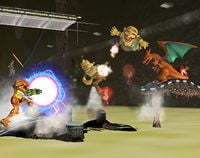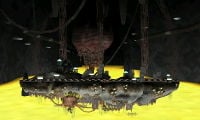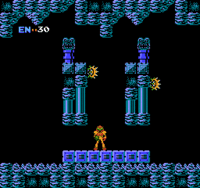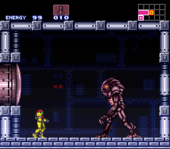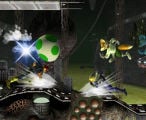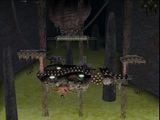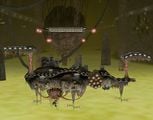Brinstar
| Brinstar | |
|---|---|
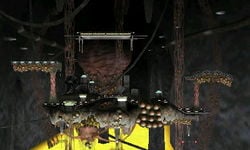 Brinstar in Super Smash Bros. for Nintendo 3DS. 
| |
| Universe | Metroid |
| Appears in | Melee Brawl SSB4 (3DS) Ultimate |
| Availability | Starter (Melee, Brawl, and SSB4) |
| Crate type | Futuristic (Brawl and SSB4) |
| Tracks available | In Melee: Brinstar Brinstar Depths (Alternate in Adventure Mode) In Brawl: Brinstar (Melee) Brinstar Depths (Melee) Bolded track must be unlocked In SSB4: Brinstar Brinstar Depths (Alternate) |
| Article on Metroid Wiki | Brinstar |
Brinstar (ブリンスタ, Brinstar) is the default Metroid stage that appears in Super Smash Bros. Melee, Super Smash Bros. Brawl, Super Smash Bros. for Nintendo 3DS, and Super Smash Bros. Ultimate. It is essentially a redesign of Planet Zebes from the original Super Smash Bros..
Stage layout
The stage consists of a main, rocky platform, two soft platforms on the side and a hovering metallic soft platform in the center. The main platform can be passed through from below, and it actually consists of two parts held together by a fleshy blob on the right side: said blob can be weakened by attacks, and when destroyed the main platform gets separated. The same can happen to the fleshy poles which keep the main platform and the side ones together: when they are destroyed, the platforms that were being supported tilt at a very sharp angle.
The destroyable parts will start to regenerate if they are not continuously attacked, fully growing back after a while. While regenerating, the substance that holds the stage together is fall-through.
Occasionally, an earthquake occurs and acid starts to rise, sometimes covering parts of the stage. The acid deals damage and heavy knockback on touch, though while it is rising it will prevent characters from being KO'd on the bottom blast line. It will rise and pause at various intervals, rarely reaching its highest point where it will cover everything except the topmost platform (and the tops of the side platforms if their supports are broken). After a while, the acid subsides.
In the back of the main platforms there are some ruins and a lone Chozo statue, which occasionally gets up and walks around with no gameplay effect. The background is occupied by a large pool of acid with an unidentified fleshy being rising from it.
Brinstar is considered the best Jigglypuff and Ganondorf stage in Melee (due to Rest combos with Jigglypuff and forward aerial combos with Ganon off the lava) and one of the better Mr. Game & Watch and Wario stages in Brawl (due to air camping beneath the platform).
Ω form
The stage consists of the middle platform, but straightened out and extended. The acid never rises.
Tournament legality
This stage used to be a counterpick stage because many did not see the acid as a major problem, and instead focused on its strange, but relatively non-obtrusive stage design. However, it was later banned in Melee and deemed more of a banned stage than a counterpick stage in Brawl, not making the stage list in major tournaments such as Apex 2012 despite the Unity Ruleset proclaiming it as a counterpick. This stage is still banned because many players agree that it gives monopolizing advantages to certain groups of characters. The acid reduces the stage to a very small size, forcing characters to stay in the air and giving unfair advantages to characters with good aerial games. Characters with good meteor smashes or spikes such as Falco and Captain Falcon also dominate as they can repeatedly rack up damage by thrusting unfortunate opponents into the acid, which knocks them back up to repeat the process. Additionally, Peach's float ability and Jigglypuff's rising Pound allow them to completely nullify the threat of being burned by the acid.
Origin
Brinstar is the first level that the player has to venture through in original Metroid. It is a large cave complex in the underground of Zebes, like most of the locations of early Metroid games.
Some rooms in Metroid's Brinstar feature yellow acid on the ground, which deals continuous damage on contact. Said acid also appears in Super Metroid: it starts to rise in Mother Brain's room after an earthquake, which could be the inspiration of the acid's movement in this stage.
A large part of Metroid's gameplay is exploration, which often involves destroying blocks with bombs to reveal secret passages: in particular, some blocks have a fleshy appearance similar to the one of the middle section of the stage. The pillars at the sides of the stage could be a reference to the Zebetite pillars which act as obstacles in Mother Brain's room in both Metroid and Super Metroid: they both get thinner with subsequent hits until they get destroyed; however in the source games they don't grow back.
The blocks with angry faces originally appeared in Metroid in the room where the Morph Ball is found.
In the Metroid games Chozo Statues act as pedestals carrying items in their hands. Some of them are able to walk, carrying Samus with them enabling her to reach hidden areas, while others, called Torizos, are hostile and act as mini-bosses.
Gallery
Trivia
- There are several references to Mother Brain in this stage:
- The fleshy stalks that connect the platforms could reference the Zebetite barriers that Samus had to break before reaching the final boss in Metroid and Super Metroid
- The gigantic alien organism in the far background somewhat resembles Mother Brain itself. While the organism lacks several of Mother Brain's characteristics, such as her recognizable single eye, a hacked camera reveals in profile that it is actually a giant brain complete with a spinal cord (which appears to be a "tentacle" otherwise).
- Hacked cameras also reveal that the stage is actually an extremely large tunnel which strongly resembles the one from Mother Brain's appearance in Metroid. The far back of the tunnel makes a very sharp left, presumably to form a "back" of the tunnel for the sake of the game's appearance.
- It is possible to perform the earthquake glitch here.
- In Brawl, during Training Mode the rise and fall of the acid and the regeneration of the organic parts are not affected by the player's choice of speed.
- This is the only Melee stage in SSB4 to not have a new remix.
- If Master Hand or Crazy Hand dies in Stamina mode, they will endlessly bounce off of the acid.
- In the SSB4 version of this stage, the Chozo statue doesn't move at all.
External links
| Stages in Super Smash Bros. Melee | |
|---|---|
| Starter stages | Brinstar · Corneria · Fountain of Dreams · Great Bay · Green Greens · Icicle Mountain · Jungle Japes · Kongo Jungle · Mushroom Kingdom · Mute City · Onett · Pokémon Stadium · Princess Peach's Castle · Rainbow Cruise · Temple · Venom · Yoshi's Island · Yoshi's Story |
| Unlockable stages | Battlefield · Big Blue · Brinstar Depths · Final Destination · Flat Zone · Fourside · Mushroom Kingdom II · Poké Floats |
| Dream Land · Kongo Jungle · Yoshi's Island | |
|
| |
|---|---|
| Fighters | Samus (SSB · SSBM · SSBB · SSB4 · SSBU) · Zero Suit Samus (SSBB · SSB4 · SSBU) · Ridley (SSBU) · Dark Samus (SSBU) |
| Assist Trophies | Metroid · Dark Samus · Mother Brain |
| Bosses | Ridley · Meta Ridley |
| Stages | Planet Zebes · Brinstar · Brinstar Depths · Frigate Orpheon · Norfair · Pyrosphere Brinstar Escape Shaft (Adventure Mode) |
| Item | Screw Attack · Power Suit Piece |
| Enemies | Geemer · Kihunter · Metroid · Reo · FG II-Graham · Joulion · Zero |
| Other | Gunship · Kraid |
| Trophies, Stickers and Spirits | Trophies (SSBM · SSBB · SSB4) · Stickers · Spirits |
| Music | Brawl · SSB4 · Ultimate |
| Masterpieces | Metroid · Super Metroid |
